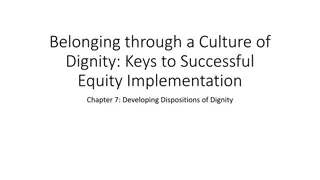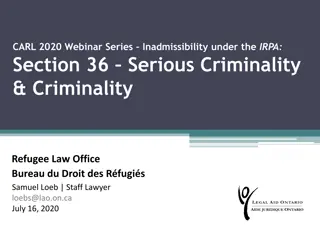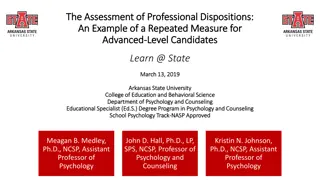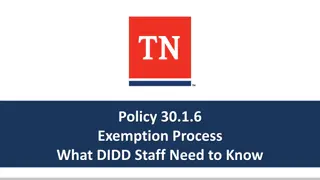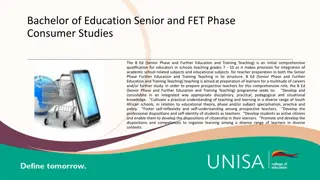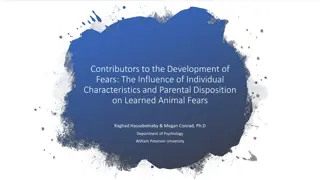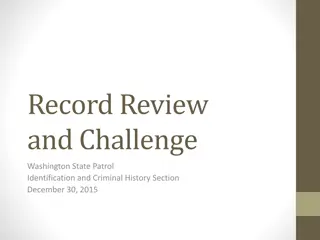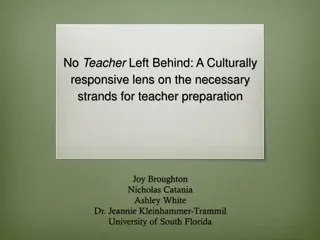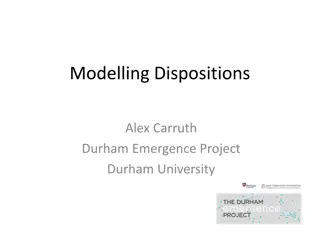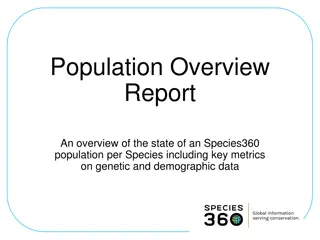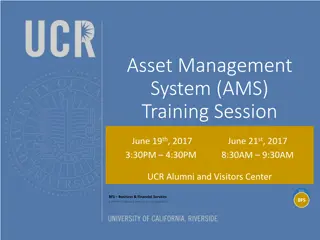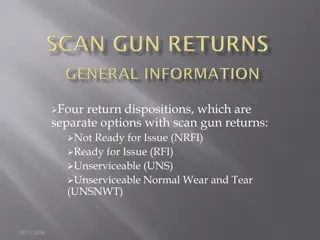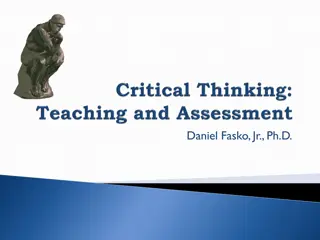Understanding Social Learning Theory and the Power of Example
Social Learning Theory, introduced by Bandura, emphasizes learning through observation and modeling. It explores how individuals acquire behavioral dispositions, trial-and-error experiences, and the impact of stimuli in the environment. The theory focuses on the importance of attention, retention, a
1 views • 17 slides
Best Kindergarten in Beauty World
ELF Preschool provides the Best Kindergarten in Beauty World. The school is committed to implement the latest advancement in early childhood research, methodology and pedagogy. Their learning approach allows pre-schoolers to acquire knowledge, skills and dispositions through lively learning activiti
1 views • 6 slides
Cultivating Dignity: Empowering Personal Growth through Authentic Engagement
Develop your personal dispositions of empathy, patience, openness, and listening to cultivate dignity and belonging. Embrace the discomfort of growth, co-create brave spaces, and embark on the dignity journey to honor yourself and others.
0 views • 16 slides
Understanding Inadmissibility under Canadian Immigration Law
Explore the complexities of inadmissibility under Canadian immigration law, focusing on sections 36(1) and 36(2) of the Immigration and Refugee Protection Act (IRPA). Learn about serious criminality criteria, in-Canada convictions, criminality definitions, and the inadmissibility process. Discover h
1 views • 38 slides
Analysis of Police Shootings of Unarmed Black Males in the US
This research article from the Brookings Institution examines the legal basis for police shootings of unarmed black males in the United States. It discusses national fatal police shootings by officers, the racial breakdown of victims, criminal case dispositions, and high-profile cases involving unar
0 views • 9 slides
Understanding Disposition of Assets for Less Than Fair Market Value in Affordable Housing
In affordable housing, applicants are required to disclose if any family member disposed of assets for less than fair market value within two years of certification or recertification. This requirement, mandated by HUD, aims to prevent asset divestment for housing eligibility. Involuntary dispositio
0 views • 8 slides
Assessment of Professional Dispositions in School Psychology Education
Assessment of professional dispositions is crucial in school psychology education to meet accreditation standards set by CAEP and NASP. The program at Arkansas State University uses a rating scale to evaluate traits like appearance, reliability, collaboration, and problem-solving abilities. Various
0 views • 6 slides
DIDD Staff Training on Policy 30.1.6 Exemption Process
This content provides information for DIDD staff regarding Policy 30.1.6 Exemption Process. It covers permissible and prohibited exemptions, requirements, and duration of approved exemptions. The training agenda includes discussions on background check exemptions, examples of dispositions, and vario
0 views • 56 slides
Bachelor of Education (Senior Phase and FET Phase) Consumer Studies Program
The Bachelor of Education (Senior Phase and Further Education and Training Teaching) program is a comprehensive qualification for educators preparing to teach grades 7-10. It integrates academic and educational subjects, emphasizing practical understanding, self-reflexivity, citizenship, diverse tea
0 views • 6 slides
Understanding the Development of Fears: Individual and Parental Influences
Exploring the impact of individual characteristics and parental dispositions on learned animal fears, this study delves into the prevalence of phobias, the development of fears and phobias, fears through the transmission of information, and the role of these factors in childhood fear acquisition. Th
0 views • 23 slides
Washington State Patrol Record Review & Challenge Guidelines
The Washington State Patrol provides individuals the opportunity to request and review their non-conviction criminal history records. The subject must appear in person with valid identification at a local law enforcement agency or the WSP office. Criminal history information includes arrests, dispos
0 views • 12 slides
Culturally Responsive Teacher Preparation: A Critical Examination
This paper discusses the impact of preservice teacher dispositions and cultural/language competency courses on novice teachers' beliefs and implementation of culturally responsive teaching. It highlights the need for teachers to possess intercultural competence and addresses the cultural gap in teac
0 views • 27 slides
Understanding Dispositions: The Conditional Analysis Approach
Explore the concept of dispositions, also known as capacities or causal powers, and the traditional Conditional Analysis (CA) approach as a dominant account of dispositions. Learn about the features and examples of dispositions such as fragility, solubility, mass, and charge, and how objects exhibit
0 views • 25 slides
Cryostat Engineering Updates and Documentation Summary
Cryostat team reports on the status of shipping posts and hardware orders, along with documentation reviews and unresolved issues with CA-02 components. Progress updates, QC checks, and pending dispositions highlighted.
0 views • 4 slides
Population Overview Report for Species360 Data
This report provides an in-depth overview of the state of a specific Species360 population, encompassing key metrics on genetic and demographic data. It includes information on ZIMS updates, report filters, acquisitions/dispositions, live age graph, metrics, contributing founders, living individuals
0 views • 24 slides
Asset Management System (AMS) Training Session - June 19th & 21st, 2017 at UCR Alumni and Visitors Center
Join us for the Asset Management System (AMS) Training Session covering equipment management basics, AMS fundamentals, asset searching, updates, dispositions, inventory verification, and more. Learn about inventorial equipment and its management role at the University of California. Enhance your und
0 views • 52 slides
Understanding Return Dispositions and Remote Returns Process in Warehousing
Explore the concept of return dispositions like NRFI, RFI, UNS, and UNSNWT in warehouse management, along with insights into Remote Returns Process (RRP) nodes and Non-RRP nodes. Learn about Regular Returns, LPNs, and the choice between consolidating returns with LPNs for efficiency. Understand the
0 views • 11 slides
Understanding Situational Crime Prevention Strategies
Situational crime prevention strategies aim to reduce crime by altering environmental conditions, influencing offender decisions, and targeting crime opportunities. Primary prevention focuses on modifying physical and social environments, while secondary prevention aims to identify potential offende
1 views • 31 slides
Enhancing Critical Thinking Skills: A Comprehensive Overview
Explore the multifaceted aspects of critical thinking, from defining the skills and dispositions to instructional strategies and assessment techniques. Learn about the importance of distinguishing fact from opinion, recognizing relevant information, seeking clarity in arguments, and embracing openne
0 views • 22 slides
ASPIRE Study: Switch to DTG + 3TC Virologic Outcome at W24 and W48
The ASPIRE study evaluated the efficacy of switching to DTG + 3TC in HIV patients with stable triple ART regimens. The primary endpoint was treatment failure proportion at W24, with non-inferiority demonstrated at W48. Virologic outcomes, adverse events, and patient dispositions were reported, with
0 views • 4 slides
The Apex Program: Advancing Through Pardons and Expungements
The Apex Program offers advancement through pardons and expungements in Delaware. Qualifications, criminal history report details, understanding the difference between being charged and convicted, examples of criminal dispositions, and information on pardons issued by Governor John Carney are covere
0 views • 28 slides


